If you have no idea what CDN is, and what its infrastructure consists of, read the basic terms connected with it and their definitions. That will give you better idea of what the technology is about.
What is the CDN
Content delivery network (CDN) is a system of interconnected servers that are spread across various geographic regions, or even around the world. CDN network boosts loading of content by caching the content on edge servers and connecting users with the closest points of presence. Its main idea is to reduce the distance between the end user and the server and make data delivery faster, because content will have to travel less distance. Duplicated content is directed through the server located as close to the user as possible.
Terminology
Asset – a resource that consists of header information and a body that can be sent to a user. It can be any kind of static content, be that an image, a video, CSS or JavaScript.
CDN URL this is any URL that directly references the CDN domain. It is usually used to request assets via the network.
Cached asset – a resource that is cached on an edge server located in a PoP (point of presence).
Customer (in this context) is an individual who visits a web-site and tries to access content from a web server.
Data delivery platform is a system of devices and servers that are distributed across the world in the network of PoPs (points of presence). They are configured to deliver some certain type of data from the origin server to clients.
Edge CNAME URL – a URL that has Edge CNAME and a CNAME record to hide the CDN URL that is automatically created after defining customer origin. Edge CNAME URL makes access to the content more user-friendly.
Edge server – is a server of a CDN network that is strategically located in some certain geographical region and serves to cache data from the origin server and transfer assets to the customers requiring it.
POP (point-of-presence) is one of locations of the network through which the clients request and receive content.
Origin server is the server where the assets are uploaded and stored. Before the assets can be accessed via CDN, they should first be received from the origin server. There are two kinds of origin servers: customer origin servers and CDN origin servers. They can be combined in the network to meet all content delivery requirements.
Customer origin server is a server that does not belong to the CDN network. Once you have uploaded data on such server, you don’t have to do anything else with the content – CDN service will distribute it for you.
CDN origin server is a dedicated storage server that sends assets to customers. When the data is stored on CDN origin server, it loads faster.
Data delivery platforms help to deliver content and can be of two types:
- HTTP small platform serves to deliver files less than 300kB and JavaScript, CSS and thumbnail images. Assets are served from RAM, which makes speed high.
- HTTP large sends assets over the HTTP/HTTPS protocol and focuses on files that are more than 300kB in size. These platforms are ideal for the delivery of images, video and audio.
Why are CDNs so popular nowadays?
CDNs have been working as a literal “backbone” of the internet for more than 20 years – with most people not realizing they’re interacting with a CDN in the first place. The Internet would not be nearly as quick and convenient as it is now if it wasn’t for CDNs and their ability to replicate content and store it within the local servers.
A regular Internet user rarely thinks about how often CDNs are used in our daily operations, including websites, ordering something online, streaming services, video-on-demand services, and many other examples.
The closest analogy to how a CDN works is the traffic routing process in the real world – without calculated traffic routing, there would be massive traffic jams everywhere, and no one would get anywhere in time. The same principle applies to the Internet – it would be extremely hard to use any services that are not located close to your physical location if it wasn’t for CDNs covering pretty much the entire world with interconnected networks of servers. These servers are then used to duplicate content and deliver it to local servers to be accessed as fast as possible.
Benefits of a CDN
As we have mentioned before, the biggest advantage of using a CDN for more or less any content is improved latency – since content distribution allows for faster page loading times. This improves the number of people that stay on the website in question and reduces the rate of people clicking off the website because of poor loading times, among other advantages.
At the same time, it is important to mention that latency is not the only benefit that global CDNs can provide. For example:
- Your website’s security can be drastically improved with a CDN service since all of the best CDN providers offer security certificate improvements, DDoS attack mitigation capabilities, and more.
- Traffic distribution via CDNs also reduces the number of potential hardware issues that can interrupt your website’s normal functionality, improving the redundancy and reliability of the network as a whole.
- Another advantage of a global CDN service is the ability to optimize the traffic that goes through its servers via caching and other methods – this, in turn, reduces the overall bandwidth costs (which is a primary expense for a lot of websites in the first place).
Who can take advantage of a CDN?
What is interesting is that website owners are not the only ones the benefit from working with a CDN service – there are at least three different groups of users that receive their own advantages when it comes to interacting with a CDN:
- Content owners – the first and the most obvious group of users, content owners use CDNs to improve their websites and media resources to achieve better results via better user experience, higher conversion rates, and other advantages that CDN can provide.
- Regular users – another rather obvious group consists mainly of all the people that interact with websites and other forms of media that work with the help of a CDN. This allows regular users to get better loading times, easier transactions, as well as better user experience as a whole – and most people are not even aware of their interactions with a CDN in the first place.
- Network Service Providers – the most unconventional group out of the three, network service providers are also deploying content delivery networks on a regular basis since the growth of multiple forms of online entertainment such as streaming drastically increases the bandwidth requirements. The implementation of a CDN allows network operators to reduce traffic to the core network, boost the development of various value-added services, and also give operators the ability to sell those CDN services to third parties and enterprises.
20 best CDN providers
Since CDN as a service has become an important part of the modern Internet as a whole, it is only natural for the CDN provider market to be extremely competitive and filled with a lot of CDN service providers. In the list below, we are going to present our take on the 20 best CDN services, in no particular order.
It is important to mention that there are several different features that a service needs to provide to qualify as a CDN – including a dispersed network of points-of-presence (PoPs), a set of features aimed at improving the overall performance of a client’s website, scalable bandwidth allowances, and so on
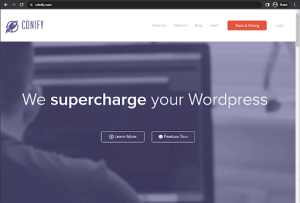
As a solution that targets startups, digital agencies, and developers, CDNify is a content delivery network that boasts flexibility and ease of use over everything. It offers high scalability levels, 24/7 customer support, as well as full API support, and various CMS integrations – Joomla, Magento, Drupal, WordPress, and so on. CDNify also offers a dedicated control panel to have all of your CDN-specific settings in one place.
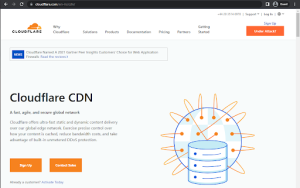
Cloudflare is one of the most well-known CDN providers in the entire world – with millions of users interacting with Cloudflare-supported resources on a regular basis. If that was not enough to prove that Cloudflare is one of the best CDN providers in the world – it has over 100 PoPs all over the world, registers thousands of customers on a daily basis, and offers a multitude of features to create the best user experience imaginable when using the Internet.

Sucuri is slightly different from your usual CDN service provider, since it is a security service provider, first and foremost. As such, CDN is one of the multiple features of Sucuri, such as malware research and detection, external attack mitigation (DDoS, vulnerability exploits, etc.), performance optimization (using a CDN of their own), and more. Sucuri’s solution is easy to set up and easy to configure, and its customer service has an incredibly high satisfaction rate of 97% with a median response time of around 4 hours.
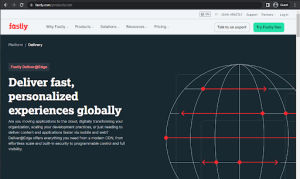
Offering both privately managed cache appliances and public CDN services, Fastly is another famous name on the CDN market. It can integrate with many different software appliances with its API, and it can also provide real-time analytical information and custom configurations to your services. Fastly’s CDN is also the only one that is built from a state-of-the-art open-source web accelerator called “Varnish”. This allows Fastly to offer faster CDN services than most of its competitors on the market.

Rackspace CDN’s main purpose is to accelerate media delivery, as well as websites, web applications, and more. It is supposed to provide the power of cloud computing to businesses without the requirement of deep expertise in the field. Rackspace CDN’s solution is easy to install, reliable and fast, and their customer services are outstanding. There might be some customization issues here and there, but it’s still one of the better solutions on the CDN market as a whole.
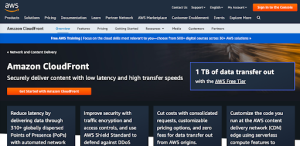
Offered by one of the largest companies in the world, Amazon CloudFront is a massive content delivery network with over 200 PoPs and a host of features to make the best out of a website’s user experience. The solution itself is capable of integrating with many other AWS services, offering an unprecedented level of collaboration in the field of content distribution, combined with high performance, low latency, and one of the lowest prices on the market.
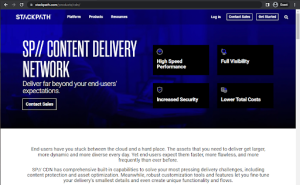
StackPath CDN is an innovative CDN that provides its clients with multiple cutting-edge features – with DualCDN and EdgeSSL being just a few of many examples. It is a fast and secure solution for all kinds of media sharing and it offers full visibility via REST API. There are built-in analytical capabilities and asset optimization protocols, as well as the support for serverless scripting, custom rules engine, and more.
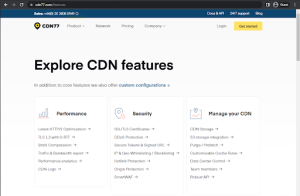
CDN77 aims to help the world with handling some of the biggest workloads imaginable, with over four million HTTP requests each second and over 8,000 DDoS attacks being repelled each month. CDN77’s network is spread over six continents and has the peak capability of 80 TB per second, with the support for video-on-demand services, live streaming platforms, as well as multiple other important fields (such as high profile space agencies). CDN77 implements many different features in its regular work, including multi-layered caching, latency-based rooting, high-class DDoS protection, combined with a client-centered approach in its business.

As the name suggests, ImageEngine is a CDN that focuses on processing and delivering images using the power of a content delivery network. There are three main components in the entire service that is ImageEngine – an image optimization technology, a patented mobile detection software, as well as a dedicated global content delivery network. The combination of these three factors creates a CDN that processes images faster than any other solution on the market – accelerating users’ websites to an impressive degree of 60% and higher.
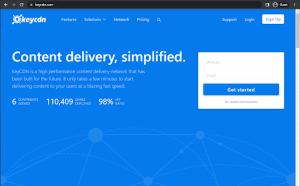
KeyCDN is a solution that aims for simplicity over anything else, offering a reliable solution with over 25 points of presence located all over the world. It has some of the lowest prices on the market ($0.04 per GB), works on a “pay-as-you-go” model, and has a host of useful features that are rare for a CDN service. Some of these features are RESTful API, 2FA, support for HTTP/2, Instant Purging, Real-Time analytical capabilities, Free SSL, and over twenty different CMS integrations (Magento, Drupal, WordPress, Joomla, and many others).

Another example of an image-specific content delivery network, imgix is a global image delivery service that balances speed and image quality to achieve the best of both worlds when it comes to image delivery to a website. imgix also offers a wide range of tools for image customization, including cropping, color enhancements, and other features that may or may not be useful to provide the best image quality to your clients.
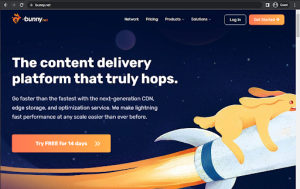
As a reliable, fast, and powerful CDN, bunny.com is a great service for any CDN-specific operations, working as a seemingly impossible combination of lightning-fast performance and an incredibly low price. All of the service’s features are included in the same package, there are no request fees, and two different networks – the “standard” one, offering a higher speed for a higher price, and the “volume” one, made specifically for bandwidth-intensive projects and offering extremely low prices per data volumes.
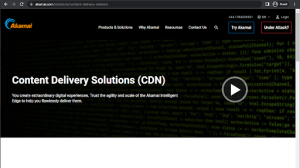
Akamai’s CDN capabilities are a part of a single Akamai Intelligent Platform – a robust cloud platform created to offer high-performance user experiences to its users. It has a massive number of PoPs, supports live streaming and other media services, can help with reducing bandwidth and improving latency, and is considered one of the best CDN services on the market.
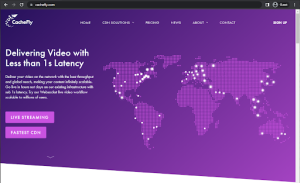
CacheFly as a CDN service is unique in its own way – it is the world’s first network build for throughput (a TCP-anycast-based content delivery network). This allows for an unprecedented file delivery speed, among many other benefits. CacheFly is mostly focused on video streaming, working with both live streaming and video-on-demand services to provide the best user experience possible. Additionally, CacheFly offers incredibly fast customer support, CacheFly’s own storage optimization system that aims to improve performance and reduce bandwidth, as well as many other advantages
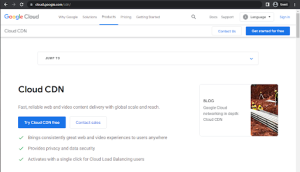
It is only fair that one of the biggest tech companies in the world offers one of the best CDN products. This applies to Google Cloud CDN – Google’s own content delivery network that takes advantage of Google’s massive number of PoPs all over the world to improve content delivery speed (both websites and applications) that work with Google Cloud Storage or Google Compute Engine. Google Cloud CDN helps with reducing server costs, improving network latency, offloading origins, and it is also extremely easy to set up – all it takes is a single checkbox after you’re done setting up HTTP(S) Load Balancing.

Rather than relying on one of the existing content delivery network solutions, G-Core Labs created their own global CDN that spreads its reach over five different continents and has more than 140 points of presence. Its main task is to help with transmitting large amounts of content over the internet with as few speed limitations as possible. The network’s peak bandwidth capacity is 75 TB per second, and the overall response time is less than 30 milliseconds.
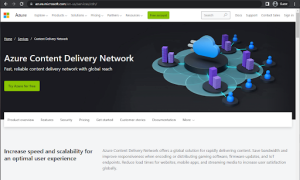
The popularity of Microsoft Azure is hard to match since a lot of companies all over the world use its services to some degree. As such, it is only fair to expect the same level of usefulness from a CDN with the same name. Microsoft Azure CDN is a fast and flexible content delivery network that has everything you may need from a CDN service, including content protection, integration with other Azure environments, extreme scalability, video streaming support, as well as a myriad of other features and use cases.
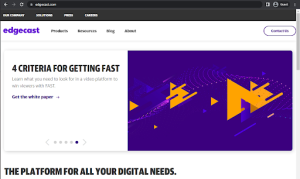
As one more example of a CDN with a well-known name, Verizon Edgecase CDN is a high-performance product that offers many different features. Some of these features are: DDoS mitigation, web app firewall, token authentication, impressive scalability, extensive reporting, etc. There is also support for caching and content acceleration (with the help of TLS connection), as well as the support for Anycast DNS over PCI DSS-compliant network.
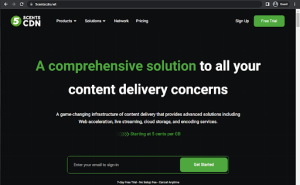
5centsCDN has a rather telling name – it does, in fact, offer a gigabyte of bandwidth for as low as 5 cents. Aside from a rather telling name, it is also a great service that puts user-friendliness as the highest priority. 5centsCDN does not require any payments for the setup, there are also no requirements in terms of contracts or other commitments, everything is as transparent as possible. The number of PoPs all over the world is massive, and the overall performance of the network makes for a great experience for any user that tries to access a resource that works with 5centsCDN.
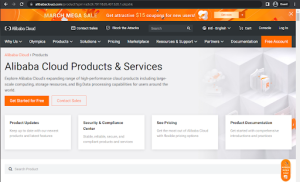
Finishing our list with a country-specific CDN, Alibaba Cloud CDN is a part of Alibaba Group that provides a CDN service, as well as a cloud storage, an SSL service, and some other features. As with most of the major solution groups, Alibaba Cloud CDN is easily integrated with other products from the same provider. Alibaba Cloud CDN is mostly focused on China, which is its main target area. It offers API integration, video-on-demand support, extensive analytics, and some other features that attracted several large Chinese companies as its clients.
Additionally, there are also multiple different companies that act as CDN resellers, offering a combination of different CDN service providers with the ability to compare pricing, feature sets, and more. One such example is SpaceCDN – a CDN reseller that offers five different CDNs to choose from: HighWinds, Verizon, UCDN, AhCDN, and CDNNOW. Each service can be compared to the rest in terms of pricing and other features, and the overall experience is very user-friendly, with free test periods, no upfront payments, no contract plans, etc.
Conclusion
The market of content delivery networks is vast and competitive, and the service itself quickly became a necessity for any normal media resource’s functioning. Choosing a single CDN solution for yourself might be rather problematic due to the sheer number of options available, which is why we have presented our list of 20 best CDN providers – with hopes that this list would be useful for you if you’re looking for a CDN service.




in social networks